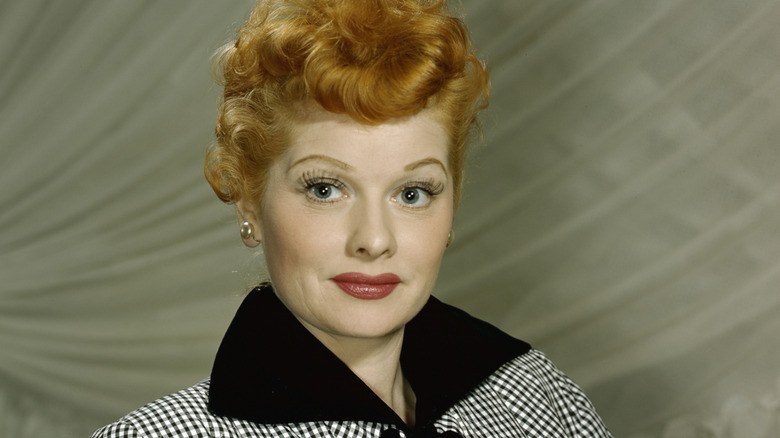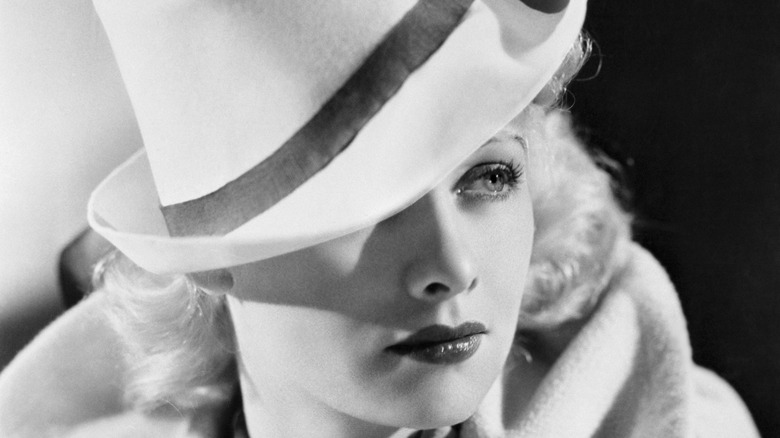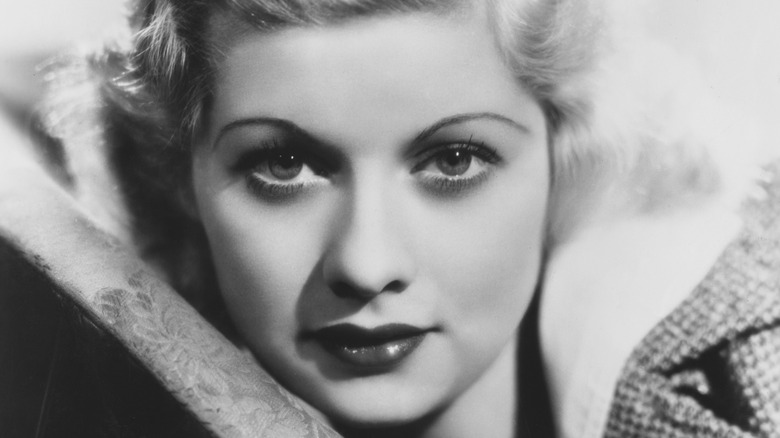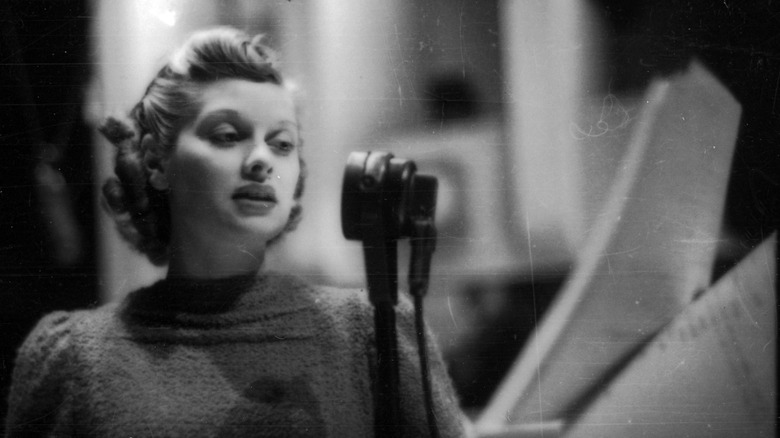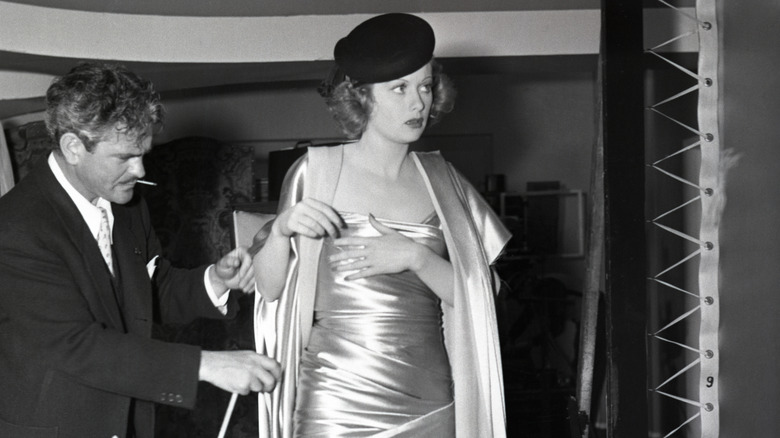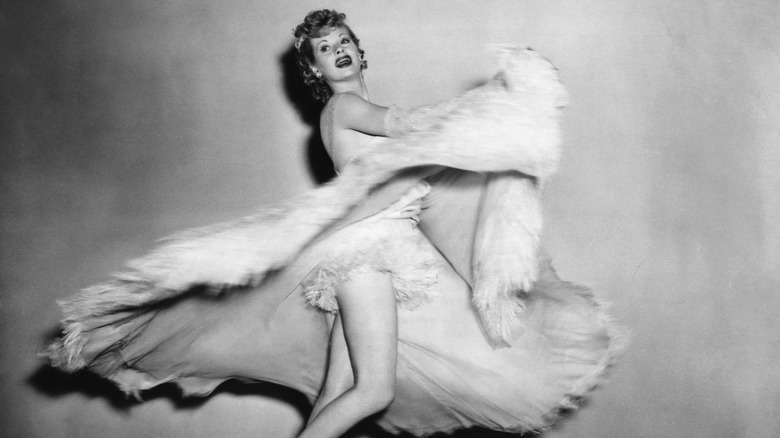The Tragic Childhood Of Lucille Ball
We may receive a commission on purchases made from links.
For generations, Lucille Ball was the face of American comedy. The New York-born actress came up in vaudeville and went on to become one of the first TV mega stars. Indeed, reruns of "I Love Lucy" are probably available on one of your TV channels or streaming apps right now. She and her TV and real-life husband, Desi Arnaz, were something of a celebrity power couple long before such a term existed. And long after "I Love Lucy" ended, Ball continued to exert her influence over the entertainment industry through shrewd business ventures. Besides "I Love Lucy," her production company, Desilu Studios, was responsible for such other iconic TV shows as "Mission: Impossible" and "Star Trek."
However, as is often the case with comic actors, Ball's public face belied a personal despair. Her marriage to Desi was turbulent and marred by infidelity and dysfunction. Her childhood was also unstable, as she and her family endured multiple tragedies when she was young. Ball would carry this trauma with her for the rest of her life.
Her father died when she was a little girl
Lucille Ball was born on August 6, 1911, in Jamestown, New York. She was the child of Henry Durrell Ball, a lineman for Bell Telephone, and Désirée "DeDe" Evelyn Ball. Due to the nature of her dad's work, the family moved around a lot in Lucy's early years, spending time in New York, New Jersey, Michigan, and Montana.
When Lucille was 3 years old (some sources say 4), her father died of typhoid fever. The actress would later say that the one memory she took home from the day of her father's death was a picture suddenly falling from the wall and sparrows feeding near the window. It left her with a lifelong case of ornithophobia (fear of birds), which even extended to being superstitious about pictures of birds.
Her mother, now a widow, moved the family back to the Jamestown area so that her parents could help raise their granddaughter. A mundane life in upstate New York didn't suit the ambitious young lady. "[At school] I'd leave the classroom for a drink of water and never come back," she told Time magazine in 1952. "I'd start walking toward what I thought was New York City and keep going until someone brought me home."
Her caretakers were religious zealots who tried to stifle her spirit
By the time Lucille Ball was 7 years old, her mother had remarried. Her stepfather, Ed Peterson, convinced Désirée to move to Detroit and leave Lucille and her little brother, Fred, in the care of other family members. Ball went to live with her step-grandparents. Described as a "puritanical Swedish couple" in the book "Lucy & Desi: The Legendary Love Story of Television's Most Famous Couple," her new caretakers were severe. They went so far as purging their home of nearly all mirrors in order to thwart any possible vanity.
One day, the future actress was caught by her step-grandmother, Sophia Peterson, admiring herself in the only mirror in the house in the bathroom — a moment of forbidden vanity so impertinent that Ball's grandmother gave her a dressing-down she would never forget. Sophia would also make fun of the girl's physical features. The ordeal lasted a little more than a year, but it severely scarred Ball's psyche for life.
Her family was impoverished due to a tragic accident
When Lucille Ball was 12 years old, things had become ever-so-slightly better for her. She was back with her family living under one roof, spending time with her maternal grandfather, who she called "Daddy," and finally being allowed to perform. Her stepfather, Edward Peterson, was a Shriner. At the time, his chapter was looking for chorus girls, and little Lucille craved the spotlight and loved attention. Soon enough, she had her first real acting gig. But this period in her life was also marked by several tragedies, including the death of her maternal grandmother to cancer, and a devastating accident that left the family destitute.
Ball's grandfather was supervising the children while they were target shooting on the family property. A neighbor boy accidentally ran in front of them and was hit by a .22 bullet, which severed his spine and left him paralyzed for life. A court later ordered the family to sell their home and possessions, forcing the group to move out of the small town of Celoron, where they lived, and into a Jamestown apartment. The incident also effectively destroyed Ball's grandfather. "They took our house, the furnishings that [my mother] had bought so laboriously on time, week after week, the insurance — everything," she recalled in her autobiography, "Love, Lucy." "My grandfather never worked again. The heart went out of him ... it destroyed our life together there [in Celoron]."
Ball had a bad-boy boyfriend rumored to be a rum runner
When Lucille Ball was 14, her friends introduced her to their older brother, Johnny DeVita. Ball was already starting to cut loose by playing hooky from school, bobbing her hair as was then extremely fashionable, wearing makeup, and even getting into schoolyard fights. DeVita was short and stocky, wore expensive suits, and sported a mustache. He was also 21, rumored to be a bootlegger (this was during Prohibition), carried a gun, and gambled. Ball was smitten.
DeVita and Ball became a hot item and grist for the local gossip, which Ball enjoyed. When her mother, Désirée, found out about the relationship, she argued with her daughter about going out with a local hood, but she eventually relented, believing it wouldn't last. When it continued for more than a year, she forbade DeVita from seeing her daughter. He refused, and the relationship continued. Désirée then came up with a plan to break up the couple. She found the money to send her daughter to drama school in Manhattan. Johnny couldn't compete with Ball's dream, and their relationship began to fall apart.
Lucille Ball was told she had no talent
If Lucille Ball thought a Manhattan drama school was her ticket to the entertainment world, the teenager was sorely mistaken. "I didn't begin to have what it takes to succeed in show business when I first came to New York City as an upstate country kid of 17," Ball admitted in "Love, Lucy." From the first day at the John Murray Anderson School, she felt out of place and intimidated. "Ridicule seemed to be part of the curriculum," she would later say (via "Ball of Fire: The Tumultuous Life and Comic Art of Lucille Ball"). Ball was told she couldn't dance, pronounced her words like a Midwesterner when she spoke, and wasn't outgoing enough. She lasted all of six weeks.
"Lucy's wasting her time and mine: She's too shy and reticent to put her best foot forward," her instructor wrote to her mother (via "Desilu: The Story of Lucille Ball and Desi Arnaz"). Ball returned to her home upstate and briefly resumed her relationship with Johnny Devita, which later ended in a violent quarrel. She soon returned to New York City, became a model, and eventually made it to Hollywood. But the tragedies she'd lived through in her childhood stayed with her until the end.
